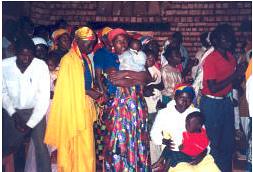Ethnicity: Iraq: Black Iraqi refugees, refugees driven into Jordan and Syria

After running yesterday's blog-entry with the historical background on the Black people of Iraq, today I received in my email, a newsletter from Christian Aid entitled "Missions Insider" (there is a website, but the search engine does not yield any online articles resulting from my search terms). It contained the picture and text below, which illuminates and updates yesterday's historical material.
Every day thousands of Iraqis flee their country due to the continuing sectarian violence, poverty, lack of basic infrastructure, unemployment, and civil unrest. Nearly 20% of Iraqis are living below the poverty line.Now I'm finding additional attention to Iraq's history of enslaving Blacks and the Black communities that survived even thru Saddam Hussein's day, but of whom many are now among the flood Iraqi refugees in surrounding Arab countries. I've seen no new info yet on whther these people tend to be Sunnis or Shi'ites or both.
Most Iraqi refugees take shelter in the Arabic-speaking countries of Jordan, Syria and Lebanon. Many of them have never heard the gospel. One Christian Aid-supported ministry, covertly working in the Middle East, has found that these refugees are often open to the gospel. Christians have a multitude of opportunities to reach out to these refugees, who are left without the aid of the government.
Once away from their family, friends and culture, refugees frequently question their native religions. Despite the great challenge, ministries in Jordan, Syria and Lebanon are taking this important opportunity to share the gospel with Iraqis.
Jordan: Approximately 700,000 Iraqi refugees are living in Jordan with limited legal status. While wealthy Iraqis fled to Amman and live very well, most suffer from poverty and lack basic necessities. Often they have left behind all of their belongings. The flow of refugees continuously increases, yet international aid has decreased. Indigenous ministries tackle the basic yet increasing needs in Jordan by providing food parcels to the refugees. One ministry, which has started many churches throughout the country, is distributing these parcels containing sugar, rice, tomato paste, canned meat and oil.
Syria: Indigenous ministries continue to facilitate the distribution of food parcels and Bibles to needy Iraqi families in Syria. These ministries also support a medical clinic to provide needy patients with free medical prescriptions. Now that more than 1 million Iraqi refugees live in Syria, representing more than 5% of the country's population, Syria has decided to prohibit Iraqis from entering the country. Since 2003, with the high influx of refugees, food and housing prices have skyrocketed. Children comprise 48% of the Iraqi refugee population in Syria. Although permitted to attend school, Iraqi children are discriminated against. Education provided by Christians is always welcomed and appreciated by this marginalized group. Two Christian Aid-supported ministries in particular have opened schools for Iraqi children. Because Syria does not issue work permits to Iraqi refugees, most adults are either unemployed or working illegally. Syrian ministries are providing vocational training for jobs that refugees can legally perform.
More Info:
'Black Iraqis' and African Heritage in an Islamic State [audio, NPR, Tony Cox]
News & Notes, January 6, 2005 · NPR's Tony Cox talks with Theola Labbe of The Washington Post about so-called "black Iraqis" -- Iraqis of African descent -- and how they identify race, class and culture in an Islamic state.
Richard Prince's Journal-isms (Jan19,2k4)
Blacks Are an Intrinsic Part of Iraqi Society
The black presence in Iraq became the subject of the second piece in a major newspaper in a week's time. On Saturday, the Los Angeles Times devoted its "Column One" space to a report by black journalist Ann M. Simmons.
"Blacks are an intrinsic part of Iraqi society, and generally are treated as such. Some have ascended to significant positions in academia, trade and other professions. Like other Iraqis, they speak Arabic, and most are Muslims belonging to the country's Shiite majority or the Sunni minority," she wrote.
Simmons said that, "For now, the demise of the former system has left government agencies and administrative departments in disarray, making access to statistical information on the ethnic breakdown of Iraq's population of 23 million difficult to obtain. Still, some academics put the number of Iraqis of African decent at about 1%, though others believe that figure could be as high as 5%."
The previous Sunday, the Washington Post ran a piece by Theola Labb�, "A Legacy Hidden in Plain Sight," that focused more on the cultural connections between black Iraqis and Africa.


1 comment:
Very interesting. Again I learned about populations in the black diaspora I never knew existed.
Post a Comment